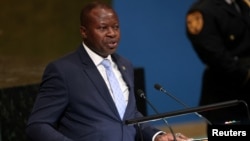In an address to the U.N. General Assembly, Lt. Col. Paul Henri Sandaogo Damiba said the overthrow of the democratically elected president was "necessary and indispensable."
"It was, above all, an issue of survival for our nation,” he said. That's even if it was “perhaps reprehensible in terms of the principles held dear by the United Nations and the international community as a whole.”
Burkina Faso's coup came in the wake of similar takeovers in Mali and in Guinea, heightening fears of a rollback of democracy in West Africa. None of the juntas have committed to a date for new elections.
However, many in Burkina Faso supported the military takeover, frustrated with the previous government’s inability to stamp out Islamic extremist violence that has killed thousands and displaced at least 2 million.
Yet the violence has failed to wane in the months since Damiba took over. Earlier this month, he also took over the position of defense minister after dismissing a brigadier general from the post.
The Burkina Faso leader said Friday that his transitional government will remain in power for almost two more years despite calls from West African nations for a quicker return to democratic rule.
But Damiba gave no precise date for the holding of new elections in his speech to the U.N. General Assembly.
He warned, however, that the Islamic insurgency embroiling Burkina Faso has security risks for the rest of the world too emphasizing that Europe “is the closest continent to Africa.”
“No precautions or prevention measures will prevent terrorism from crossing the Atlantic if the Sahel is abandoned,” Damiba said. “Nothing at all will be able to stop the youth in the Sahel countries and its surroundings from giving in to the temptation of perilous immigration to Europe through the Sahara and the Mediterranean if these youth no longer have any hope by staying at home."









